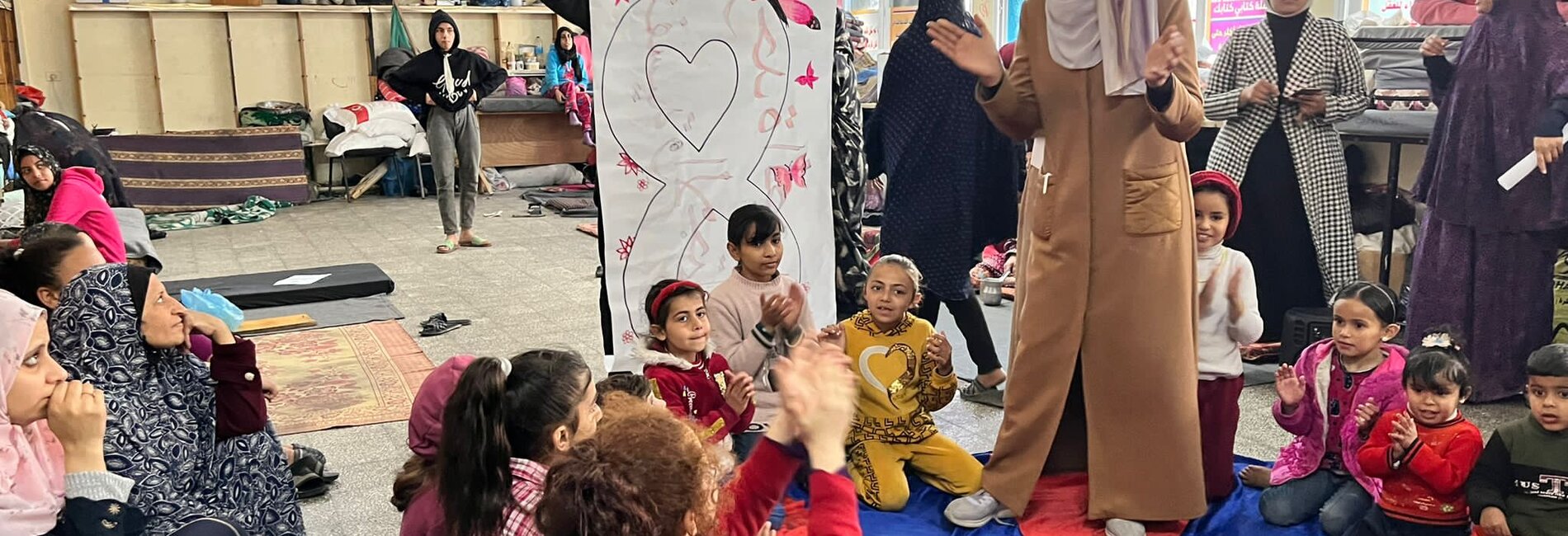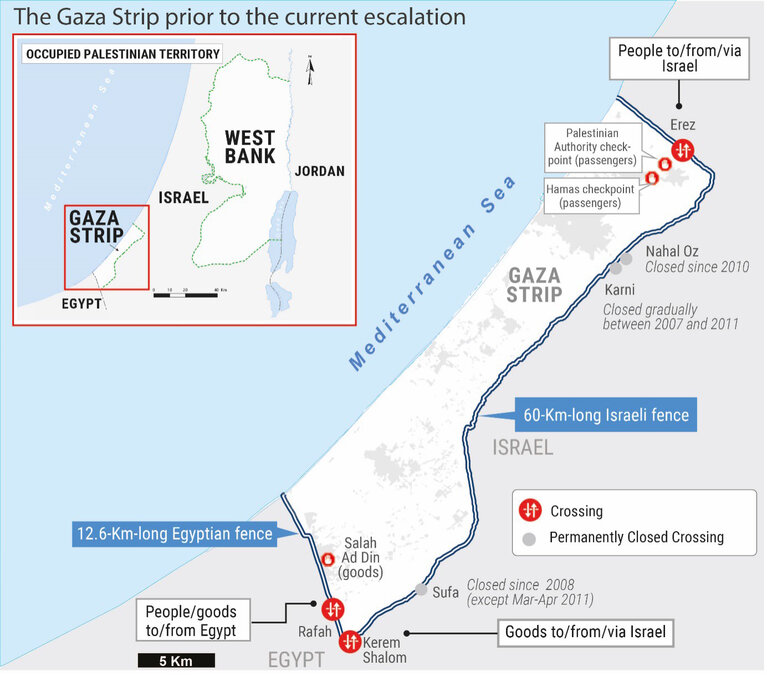Hostilities in the Gaza Strip and Israel | Flash Update #137
Key Highlights
- On 11 March, a team of the World Health Organization and its partners delivered 24,050 litres of fuel, food, and medical supplies for 42,000 patients at Shifa Hospital in northern Gaza.
- On 11 March, about 75 orphans and other vulnerable children were evacuated by SOS Children’s Villages from Rafah to an orphanage in the West Bank.
- As of 12 March, the Ministry of Health (MoH) in Gaza reported that 27 people have died of malnutrition and dehydration at hospitals in northern Gaza.
Gaza Strip Updates
- Intense Israeli bombardment and ground operations as well as heavy fighting between Israeli forces and Palestinian armed groups continue to be reported across much of the Gaza Strip, resulting in further civilian casualties, displacement, and destruction of houses and other civilian infrastructure.
- Between the afternoons of 11 March and 12 March, according to the MoH in Gaza, 72 Palestinians were killed and 129 Palestinians were injured. Between 7 October 2023 and 12 March 2024, at least 31,184 Palestinians were killed in Gaza and 72,889 Palestinians were injured, of whom 72 per cent are women and children, according to MoH in Gaza.
- The following are among the deadly incidents reported between 10 and 11 March:
- On 10 March, at about 14:00, at least 10 Palestinians were reportedly killed when a house in Tal Al Hawa, west of Gaza city, was hit.
- On 11 March, at about 1:00, three female Palestinians were reportedly killed, and others injured, when a house in Khirbet Al Ades area, in northeastern Rafah, was hit.
- On 11 March, during the morning, 16 Palestinians were reportedly killed, and others injured, when a house in the Az Zaytoun neighbourhood, in Gaza city, was hit.
- Between the afternoons of 11 and 12 March, according to the Israeli military, there were no Israeli soldiers killed in Gaza. As of 12 March, 247 soldiers have been killed and 1,475 soldiers injured in Gaza since the beginning of the ground operation, according to the Israeli military. In addition, over 1,200 Israelis and foreign nationals have been killed in Israel, the vast majority on 7 October. As of 12 March, the Israeli authorities estimate that 134 Israelis and foreign nationals remain captive in Gaza, including fatalities whose bodies are withheld. On 12 March, the Israeli authorities reportedly announced the killing of a soldier thought to be held captive in Gaza, indicating that his body is still being withheld.
- At the request of the Government of Germany, on 11 March, about 75 orphans and other vulnerable children between three and 15 years of age were evacuated by staff from the SOS Children’s Villages from Rafah to an orphanage in Bethlehem, in the West Bank. The group received approval from the Israeli authorities to enter Egypt through the Rafah Crossing, and then Israel via the Taba crossing with Egypt. Israeli forces reportedly accompanied the convoy from the Taba border crossing to Bethlehem. Children in Gaza are among the worst affected by the conflict, with the Government Media Office in Gaza reporting that some 13,000 children have been killed since the start of the war. In a statement issued on 18 January, SOS Children’s Villages reported that extended families who had taken in children orphaned in airstrikes were struggling to provide for them and were requesting that the organization take them in. According to UNICEF, 17,000 children in Gaza are currently unaccompanied or separated, constituting one per cent of the total displaced population of 1.7 million people. On 9 March, UNICEF warned: "There are 600,000 children in Rafah, terrified of what’s next. From displacement and the threat of bombings to starvation and disease, so many are suffering the unimaginable, and now they are trapped in an overcrowded space with death getting closer.”
- Hospitals across Gaza continue to face critical shortages of fuel, surgical equipment, anaesthetic drugs and other medications, food and health personnel, particularly in northern Gaza where only six hospitals are partially functional. According to MoH in Gaza, some 2,000 medical staff in northern Gaza need ready-made meals during Ramadan. On 11 March, a team of WHO staff and partners delivered 24,050 litres of fuel, food, and medical supplies for 42,000 patients at Shifa Hospital in northern Gaza; supplies included anaesthetic drugs, surgical materials and medicines. The team also carried out an assessment mission at Al Helou Hospital, also in Gaza city, to determine urgent needs. Highlighting the challenges facing medical staff in Gaza, on 7 March the President of Médecins Sans Frontières (MSF), Dr. Christos Christou, stated: “When I visited some of our staff in Palestine a few months ago, they were already mentally and physically exhausted. Now, I fear they are at breaking point.”
- Acute malnourishment is disproportionately affecting children, particularly in northern Gaza, with devastating impacts in both the immediate and long terms, according to World Vision. As of 12 March, MoH reported that 27 people, including 23 children, have died of malnutrition and dehydration at hospitals in northern Gaza. Warning that the number of deaths from starvation, “is likely to be much higher,” World Vision underlined that “the immediate delivery of food and other lifesaving humanitarian aid is now a question of life or death for the children who have been caught up in this crisis.” On the night of 11 March, media outlets reported that a shooting incident at the Kuwait roundabout southeast of Gaza city resulted in at least nine fatalities and numerous injuries. The attack targeted individuals congregated to collect vital aid. The UN Human Rights Office (OHCHR) had documented 14 such incidents at two entrances of Gaza city between mid-January and the end of February, and at least 11 additional incidents were reported between 1 and 8 March, during which at least 28 Palestinians have been reportedly killed.
West Bank Updates
- In the evening hours of 11 March, an undercover Israeli forces unit raided Attil village in Tulkarm governorate, shot and killed one Palestinian inside a supermarket, and seriously injured another who later died at a hospital. According to the Israeli military, its forces killed an armed Palestinian on his way to carry out an attack. According to the Palestine Red Crescent Society (PRCS), Israeli forces delayed ambulance access to evacuate the casualties for about half an hour. The body of one Palestinian fatality is still being withheld by Israeli forces.
- Since 7 October, 412 Palestinians have been killed, including 311 by Israeli forces, nine by settlers and two by either Israeli forces or settlers, across the West Bank, including East Jerusalem. These include a total of 102 Palestinians killed since the start of 2024 (compared with 80 during the same period in 2023), the vast majority killed by Israeli forces. Over 4,660 Palestinians have been injured, including 718 children, since 7 October in the West Bank.
- A Palestinian man was physically assaulted and injured by Israeli settlers near Homesh settlement in Nablus, while he was reportedly picking wild thyme on 9 March. So far since 7 October 2023, OCHA has recorded 629 Israeli settler attacks against Palestinians that resulted in Palestinian casualties (57 incidents), damage to Palestinian-owned property (501 incidents), or both casualties and damage to property (71 incidents). Most of these incidents (over 400) took place between October and December 2023.
- Since 7 October, 15 Israelis, including four members of Israeli forces, have been killed and 97 injured in the West Bank, including East Jerusalem, and Israel.
- On 10 March, the Israeli authorities demolished four houses, including two under construction, in Area C of the West Bank, due to the lack of Israeli-issues building permits; these include a house in Furush Beit Dajan and three other houses in Al Jiftlik al Musaffah, both in the Jordan Valley area. As a result, two households comprising 11 people, including six children, were displaced.
- Since the beginning of 2024, there has been a decline in the number of people displaced as a result of lack-of-permit demolitions in the West Bank compared with the same period in 2023 (212 vs. 329); however, house demolitions and resultant displacement in East Jerusalem has slightly increased, with 34 houses demolished and 133 people displaced between 1 January and 12 March in 2024 compared with 31 houses demolished and 115 people displaced during the same period last year.
- On 11 March, an exchange of fire took place between Israeli forces and Palestinians, who threw pipe bombs during a raid by Israeli forces in Nur Shams Refugee Camp in Tulkarm city. Israeli forces bulldozed roads inside the camp, the main entrance of the camp and the main road that links the camp with Tulkarm and Nablus, causing damage to water, electricity, sewage and internet infrastructure. As a result, it is estimated that over 84,600 people in Nur Shams refugee camp and Tulkarm city were affected. Three houses and at least one livelihood structure were also destroyed. Since 7 October 2023, some 866 Palestinians, including 358 children, have been displaced because of the destruction of their houses during operations carried by Israeli forces in the West Bak, the vast majority (93 per cent) in the refugee camps of Nur Shams, Tulkarm and Jenin.
Funding
- The Flash Appeal for the occupied Palestinian territory (OPT), which requests US$1.2 billion to meet the critical needs of 2.7 million people across the OPT (2.2 million in the Gaza Strip and 500,000 in the West Bank, including East Jerusalem), was extended through the end of March 2024. As of 12 March, member states disbursed nearly $973 million for the updated Flash Appeal (79 per cent); this includes about $616 million out of $629 million (98 per cent) requested for October-December 2023 and $357 million out of $600 million (59 per cent) requested for January-March 2024. For funding analysis, please see the Flash Appeal Financial Tracking dashboard.
- During February 2024, the OPT Humanitarian Fund (OPT HF) had a total of 122 ongoing projects, for a total of US$ 74.5 million, addressing urgent needs in the Gaza Strip (83 per cent) and West Bank (17 per cent). Projects focus on the areas of Education, Food Security, Health, Protection, Emergency Shelter & NFI, WASH, Coordination and Support Services, Multi-Purpose Cash Assistance and Nutrition. Of these, 77 projects are being implemented by international NGOs (INGOs), 29 projects by national NGOs (NNGOs), and 16 projects by UN agencies. Of the 93 projects implemented by INGOs or the UN, 52 are being implemented in partnership with NNGOs. The OPT HF has also recently finalized its critical and time sensitive First Reserve Allocation of 2024, titled "Emergency Fleet Augmentation for Enhanced Gaza Aid Delivery", amounting to US$3.5 million. The allocation aims at boosting the aid transport capacity to enable humanitarian partners to increase the delivery of vital aid and services to people across the Gaza Strip. For a summary of the OPT HF activities in February 2024, please follow this link. Since 7 October, the OPT HF has received a total of $88 million in contributions from member states and private donors. Private donations are collected directly through the Humanitarian Fund.
For the Humanitarian Needs and Cluster Response Update for the period between 5 and 11 March, please visit: Humanitarian needs and response update | 5-11 March 2024.The update was initially published on 11 March and new content has been subsequently added.
* Asterisks indicate that a figure, sentence, or section has been rectified, added, or retracted after the initial publication of this update.











